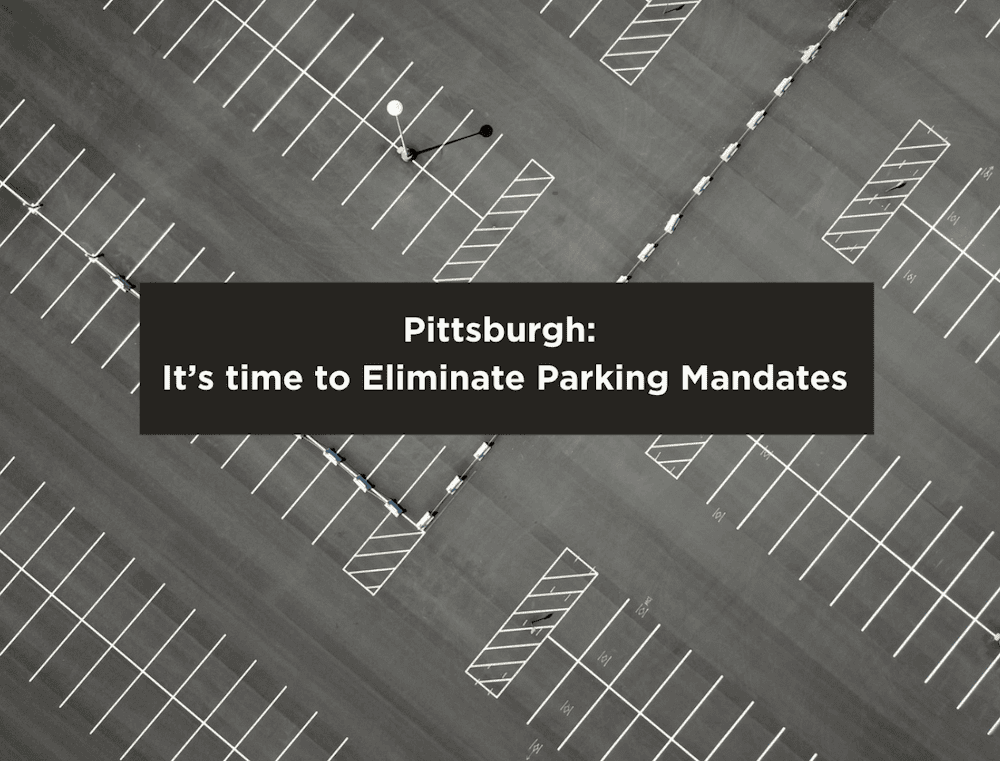
Eliminating mandatory parking minimums is a crucial step toward a city where everyone can thrive, no matter how they get around
by Scott Bricker, Executive Director
Last year, I made the case for shaping Pittsburgh’s first-ever Comprehensive Plan around the idea of becoming a 15-Minute City—a place where people can meet most of their daily needs within a short walk or bike ride from home. One of the biggest barriers to making that vision a reality is Pittsburgh’s outdated car parking requirements.
As I mentioned then, Mayor Gainey put forward a package of zoning code changes aimed at improving housing affordability. But one element of that package—citywide inclusionary zoning—has generated controversy and, in the process, has held up the rest of the reforms. Meanwhile, new developments are still being planned and permitted under the current rules, which require far too much expensive car parking—something that developers, housing advocates, and mobility advocates all agree is a problem.
We are hopeful that the Mayor’s Office and City Council can work on a compromise so that the package of zoning reforms can be taken up and voted on. However, if that compromise fails, City Council should extract the parking reforms from the rest of the zoning package and vote to pass it separately. Every building being designed and permitted now is subject to the current outdated mandates, which will continue to do real harm today and into the near future.
Parking mandates drive up costs and limit what we can build.
Requiring a set number of parking spaces—often at a cost of $10,000 to $30,000 or more per space—adds significant expense to housing and business development. That money gets passed on to renters and buyers, even if they don’t own a car. For small or oddly shaped lots, the mandates can make development infeasible altogether. Removing them would unlock new types of projects and lower overall costs.
They also ignore how people actually get around. For at least the past decade, it’s held steady that nearly 25% of Pittsburgh households don’t own a car, yet our zoning code assumes that everyone drives. These mandates encourage car dependency, make streets more dangerous for people walking and biking, and undermine efforts to create more connected, people-friendly neighborhoods. Getting rid of these rules makes it easier to build the kinds of neighborhoods people actually want—where homes, jobs, and services are just a short walk or bike ride away.
And the environmental costs are steep. Not only does excess parking contribute to more driving and thus pollution, surface parking lots contribute to stormwater runoff, preventing rain from being absorbed into the ground and overwhelming our aging sewer system. In a hilly, riverfront city like Pittsburgh, these lots contribute to more debris and pollutants washing into our rivers and runs. No one should be required by law to worsen our stormwater problem or degrade our environment.
Eliminating mandatory parking minimums is about building a city that works better for everyone—regardless of how they get around. We shouldn’t let car storage take priority over people. We are optimistic that the Mayor’s Office and City Council can quickly iron out the issues holding up the package of zoning reforms, but Council should not hesitate to vote to pass the parking reform bill separately should the negotiation reach an impasse.
Special thanks to Joe Lampe from Resilient Future Consulting for his research that informed this blog.
